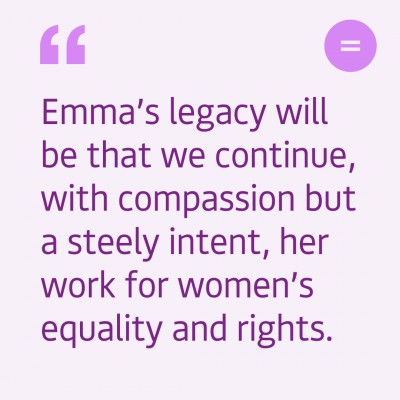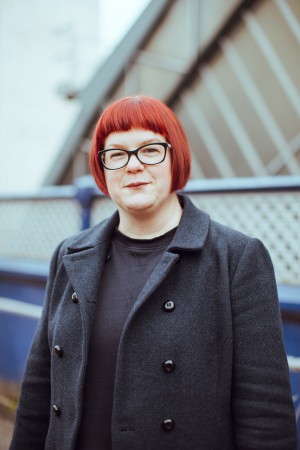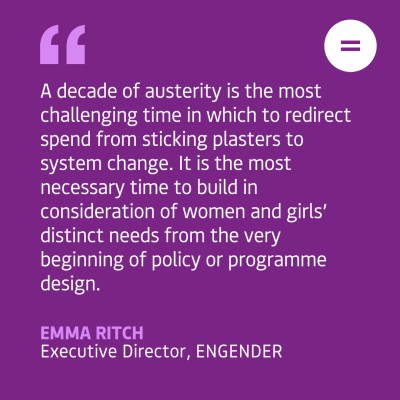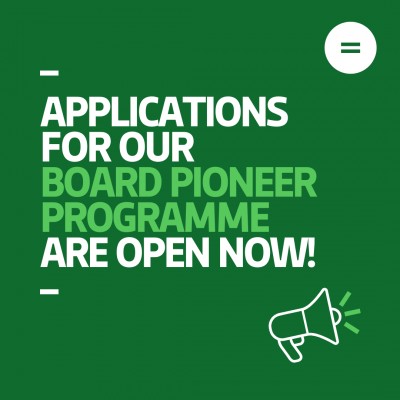Engender blog
All of Engender’s latest news. Reports, reviews, books, articles, and information from across Scotland’s women’s sector.
We would love to hear from other feminists around Scotland. Check out our guidelines for more information on how you can blog for us.
Honouring Emma’s Legacy

We’ve been overwhelmed, and so touched, at the tributes which have been left for our Executive Director, Emma Ritch.
From the Turkish Women’s Lobby who worked with Emma on protecting the Istanbul Convention, to people who attended Rape Crisis Scotland volunteer training with her many years ago, it’s clear that Emma’s impact on feminism went far beyond her (incredible) feminist policy work with Engender.
We're relieved that Emma’s wit, her love for stationery, and her strategically deployed eyebrows also didn’t go unmentioned in people’s messages of condolence.
But by far the clearest message throughout the tributes left for Emma, though, was the need to continue her legacy. Emma was an inspirational woman, but she would be the first to say she was just one small part of a broad movement for change. Everything she did, she did standing on the shoulders of our feminist mothers, aunts, and big sisters.
Many people have been in contact asking about memorial services, commemorative awards, and other ways to honour Emma’s memory, and the Engender board will be discussing these with Emma’s family in the coming months. For now, though, Emma’s legacy will be that we continue, with compassion but a steely intent, her work for women’s equality and rights.
There is still so much to do. The commitment to incorporate CEDAW into Scots Law, surely one of Emma’s greatest achievements, needs to be seen through. Supporting intersectional feminism in Scotland, to ensure that no woman is left behind. And the vital work of gender mainstreaming, of making sure that Equality Impact Assessments have teeth, and the constant fight for good data gathering.
But one of Emma’s last acts at Engender was to speak to journalist Karin Goodwin at the Ferret about the future of democracy in Scotland, and we thought it was fitting to end on Emma’s own words:
"Advocates for women’s equality have to be optimists.
Complacency is one of the biggest things standing in the way, but we know that there is huge appetite for doing things differently among the women of Scotland. Change takes time, but movements like Me Too, Black Lives Matter, and Say her Name, are chipping away at the pillars propping up our unequal society.”
We will continue the fight for justice in honour of, and spurred on by memories of, our brilliant Executive Director Emma Ritch.
Love and sisterhood,
Engender's staff team and Board of Directors
--
Emma’s tribute page will remain open for people to leave their memories and words of condolence, and you can share yours here: engender.org.uk/rememberingemma
Donations:
If you would like to leave a donation in Emma's memory, details of the two charities chosen by Emma's family are:
Glasgow Women's Library
Donations can be made via the donations page on the GWL online shop. People will be able to donate via PayPal, and Emma can be named in the 'order notes' field.
British Heart Foundation
Donations can be made in memory of Emma online, by phone or by post. Full details are here.
Announcing the death of Emma Ritch, Engender's Executive Director

It is with profound sadness we share the news that our Executive Director, Emma Ritch, passed away suddenly on Friday 9th July.
GUEST POST: Bridging the gender health gap
Women and girls face signiï¬cant barriers to good mental and physical health. Historic lack of funding for, or professional focus on, health issues that disproportionately affect women, or affect women differently to men, can mean that these issues are not equally accommodated for in health services or awareness-raising initiatives. This anonymous guest blog explores gendered health inequalities and what progress is being made on bridging the gender health gap.
-400.png)
It took roughly six years of medical appointments before a tentative diagnosis of chronic pain – a condition that, by definition, is pain lasting longer than three months despite treatment. Part of the issue was that the pain, among other symptoms, had never really been treated; it was repeatedly misdiagnosed, from appendicitis to pregnancy, and continuously dismissed as stress or growing pains.
It was a strange relief to eventually be referred to an endometriosis specialist and women’s heath physiotherapist session, though the relief was short-lived – while I did receive some pain management, the former concluded that the pain did not appear severe enough to suggest the presence of the condition, nor warrant further investigation, and the latter prescribed mindfulness. Like many others, until recently I had never heard of endometriosis – despite its high prevalence rate and top ranking in the NHS’ 20 most painful conditions. I also found that, like many other people, my experience of healthcare was not unique. In recent years, there has been increasing awareness and recognition of such experiences as symptomatic of a wider issue: a gender disparity in medical research, knowledge and treatment that has amounted to a gender health gap.
Marking 10 years since the Christie Commission
A decade ago saw the report from the Christie Committee, a ground-breaking inquiry which aimed to usher in a new era in public sector delivery in Scotland. To mark 10 years since the release of the report, our Executive Director Emma Ritch joined sector leaders in a special edition of Third Force News magazine to reflect on the Commission and progress made on its recommendations.

Christie finished its work just after the public sector equality duty came into being, and its critical focus on prevention really aligns with the duty.
So much of the inequality that women experience comes from laws, policy, programmes, and institutions that have missed the opportunity to get it right for women in the first place. Everything from transport systems to parks to health services are designed around the preferences and needs of boys and men. The consequences are dire: women in Scotland have less say in their communities, less power, less safety, and fewer resources.
The Christie report didn’t mention women at all but it did recommend that equality be integrated into the National Performance Framework. It also called for the public sector equality duty to be tooled to establish partnership working on reducing discrimination and advancing equality, and for public bodies to gather sufficient equality data to inform service design. We see relatively little evidence that any of this has been realised. Only two of the 81 NPF indicators relate directly to women and girls. The public sector equality duty has been a damp squib in terms of making change happen.
Apply to our new Board Pioneer Programme
Engender is launching our new Board Pioneer Programme offering an opportunity to get involved in feminist governance and see how a board works. Find out more in this blog from our Communications & Admin Assistant Maxine.

EDIT 23/07/21: Following the unexpected death of Engender's Executive Director, Emma Ritch, earlier this month, we are postponing recruitment for the Board Pioneer Programme. We are still very committed to the scheme, and will be relaunching it in the future, when board members will have more capacity to get involved. Thank you for your understanding.
Today we’re launching Engender’s Board Pioneer Programme, based on the excellent work and success of Stellar Quines, the award-winning Scottish theatre company. Stellar Quines launched their Pioneer programme a few years ago and have created a detailed resource pack for others to use the model which highlights the importance of involving and learning from those whose voices are traditionally underrepresented on boards.
When we think of the stereotypical depiction of boards in films and tv, the image that springs to mind is a foreboding group of greying men in suits prioritising profits. According to the Young Trustees Movement, 1 in 12 trustees is named either John or David, and less than 3% of trustees are under 30 which means that the voices of young people, and young women in particular, are sorely lacking on boards across the country. The image of a board as a homogenous group does a disservice to the wealth of experience and knowledge that people from underrepresented groups can share – young people often have caring experience, or experience of working zero-hours contracts, or are involved in on the ground activism. Intergenerational perspectives enable better decision making for boards, and the widespread practice of filling trustee vacancies through informal networks means that boards tend to recruit in their own image, perpetuating the underrepresentation of carers, disabled women and girls, Black and minority ethnic groups, and LGBTI people.
Downloads
 Engender Briefing: Pension Credit Entitlement Changes
From 15 May 2019, new changes will be introduced which will require couples where one partner has reached state pension age and one has not (‘mixed age couples’) to claim universal credit (UC) instead of Pension Credit.
Engender Briefing: Pension Credit Entitlement Changes
From 15 May 2019, new changes will be introduced which will require couples where one partner has reached state pension age and one has not (‘mixed age couples’) to claim universal credit (UC) instead of Pension Credit.
 Engender Parliamentary Briefing: Condemnation of Misogyny, Racism, Harassment and Sexism
Engender welcomes this Scottish Parliament Debate on Condemnation of Misogyny, Racism, Harassment and Sexism and the opportunity to raise awareness of the ways in which women in Scotland’s inequality contributes to gender-based violence.
Engender Parliamentary Briefing: Condemnation of Misogyny, Racism, Harassment and Sexism
Engender welcomes this Scottish Parliament Debate on Condemnation of Misogyny, Racism, Harassment and Sexism and the opportunity to raise awareness of the ways in which women in Scotland’s inequality contributes to gender-based violence.
 Gender Matters in Social Security: Individual Payments of Universal Credit
A paper calling on the Scottish Government to automatically split payments of Universal Credit between couples, once this power is devolved to the Scottish Parliament.
Gender Matters in Social Security: Individual Payments of Universal Credit
A paper calling on the Scottish Government to automatically split payments of Universal Credit between couples, once this power is devolved to the Scottish Parliament.
 Gender Matters Manifesto: Twenty for 2016
This manifesto sets out measures that, with political will, can be taken over the next parliamentary term in pursuit of these goals.
Gender Matters Manifesto: Twenty for 2016
This manifesto sets out measures that, with political will, can be taken over the next parliamentary term in pursuit of these goals.
 Scottish NGO Briefing for UN Special Rapporteur on Violence Against Women
Joint briefing paper for the UN Rapporteur on Violence Against Women.
Scottish NGO Briefing for UN Special Rapporteur on Violence Against Women
Joint briefing paper for the UN Rapporteur on Violence Against Women.

Newsletter
Sign up to receive our newsletter here:
Sign up to our mailing list
Receive key feminist updates direct to your inbox: